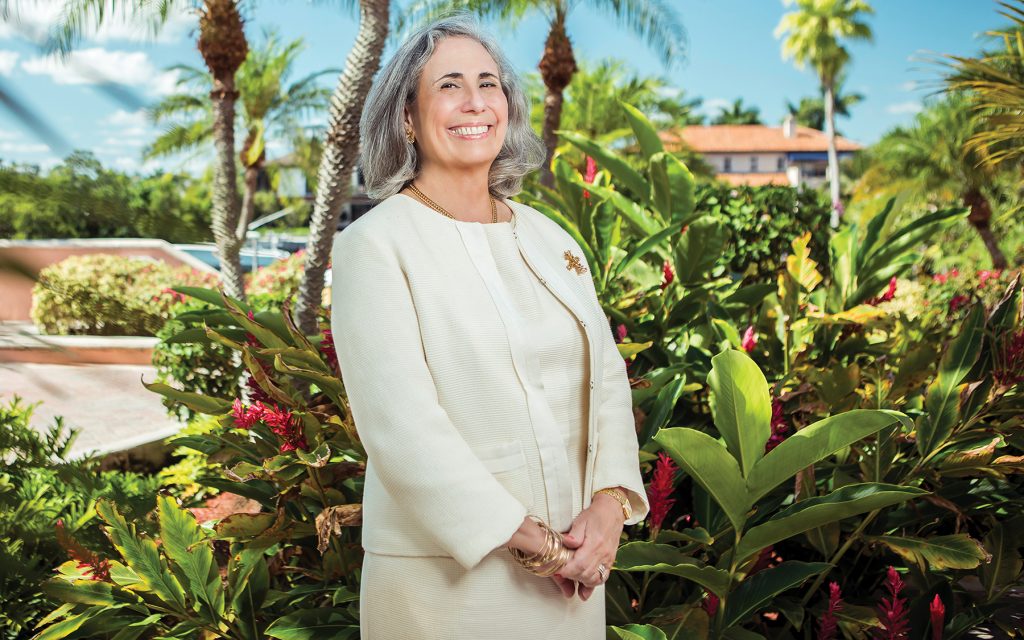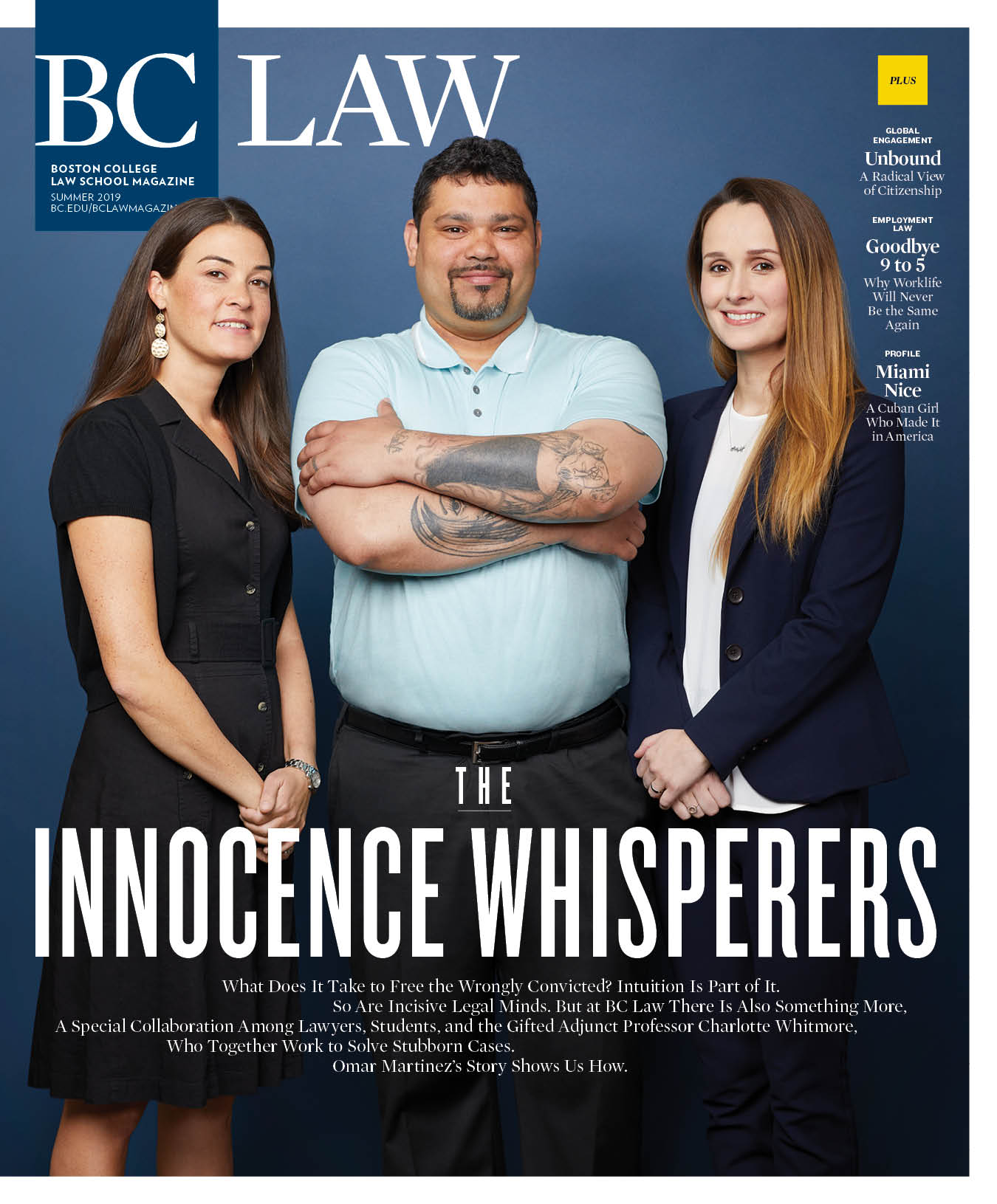It has everything to do with Cuba—and nada to do with Cuba—how life has turned out for Teresa Valdes-Fauli Weintraub ’79. Nothing, in that she was just seven years old when her family fled, and she holds scant memories of the island. Everything, in that this exodus imprinted her with a great truth: If you stay focused and family-centered, all manner of setbacks—even calamities—can be transcended.
Weintraub likes to quote her mother on this front. The Valdes-Faulis barely escaped to Florida in 1960, hoping their exile would be short-lived. The family had been prominent in Cuba since the 1500s, after all. But as Fidel Castro’s power metastasized, and the communist revolution surged, they grasped the brutal truth. There would be no going home. “I remember what my mother always told us,” said Weintraub: Don’t look back. Don’t say “poor me.” We have our freedom and we’re moving forward.
Like so many of the families who emigrated from Cuba in those days, the Valdes-Faulis lost most of what they had, plummeting from considerable wealth to a barely middle-class existence. It might be a stretch to call them the Rockefellers or Roosevelts of the Antilles, but not by much. They certainly had a heritage of riches and a rich heritage.
Take Weintraub’s parents’ family. One ancestor on her father’s side founded the city of St. Augustine in 1565 and became the first governor of Florida. Another ancestor was mayor of Havana. The Pedrosos (her mother’s side) subsequently produced generations of bankers, with ties to Cuba’s lucrative sugar industry. And in 1913, Weintraub’s grandfather, Jacinto Pedroso, founded the bank and real estate business that would become Banco Pedroso. Meanwhile, her father’s side kept churning out lawyers to the elite, and established their own family firms.
Weintraub says hers is the fifth straight generation to study the law.
In Havana’s exclusive Vedado neighborhood, with its green palms, white limestone villas, and turquoise sea views, Teresa and her three older brothers grew up in a grand villa. The family had ten live-in servants.
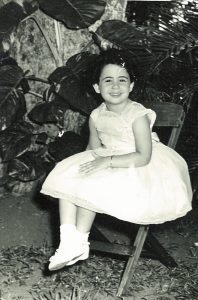
No hay acuerdo bajo presión, runs the old Cuban proverb. There’s no agreement under pressure. When Castro overthrew dictator Fulgencio Batista in January 1959, he began to apply pressure on the upper classes; few of these families agreed to hand over their holdings to the new government, or agreed to have their sons join the military, but this might be their fate if they stayed. In July 1960, the Valdes-Faulis decided it was finally too perilous to remain, booked a flight to Miami, and three generations of them headed to Havana’s airport.
“Basically, we were told just that we were going on vacation,” Weintraub recalls of how her parents framed the trip to the children. “But then when we got to the airport, someone in my mother’s family had told the authorities that we were taking jewelry and money with us.” The family was told they had to be strip-searched. “The only thing I do remember is my mother screaming that they couldn’t take me without her, couldn’t search me without her being present. We were at the airport for a long, long time before they allowed us to leave.”
Barely a year later, the family’s china, furniture, paintings, and all that had been left behind, fell victim to Resolution 454, issued by the Castro regime in September 1961. It declared that those who departed were foes of the government, and would have their “abandoned” property impounded unless they returned within twenty-nine days to claim it. That twenty-nine was a Catch-22, of course. If you came back to collect what had been seized, likely as not you would be seized.
“My mother did miss some of the fancy things,” admits Weintraub. “But she would always stop to say, ‘It’s stuff, it’s just stuff.’” The Valdes-Faulis had managed to buy a small, three-bedroom house in Key Biscayne, and the eight fleeing family members squeezed in. Over the next years, there would often be a cousin or two, or some other Cuban emigre who slept on the couch or floor before they found a place to live.
In Cuba, “I was very privileged and very sheltered,” Weintraub says, adding that she was rarely allowed out of the house: kidnappings were a real fear among the upper classes. But in the US, “I could ride bikes everywhere, and was able to go to my friends’ houses! We were in a dramatically different economic situation but I remember having a very, very happy childhood.”
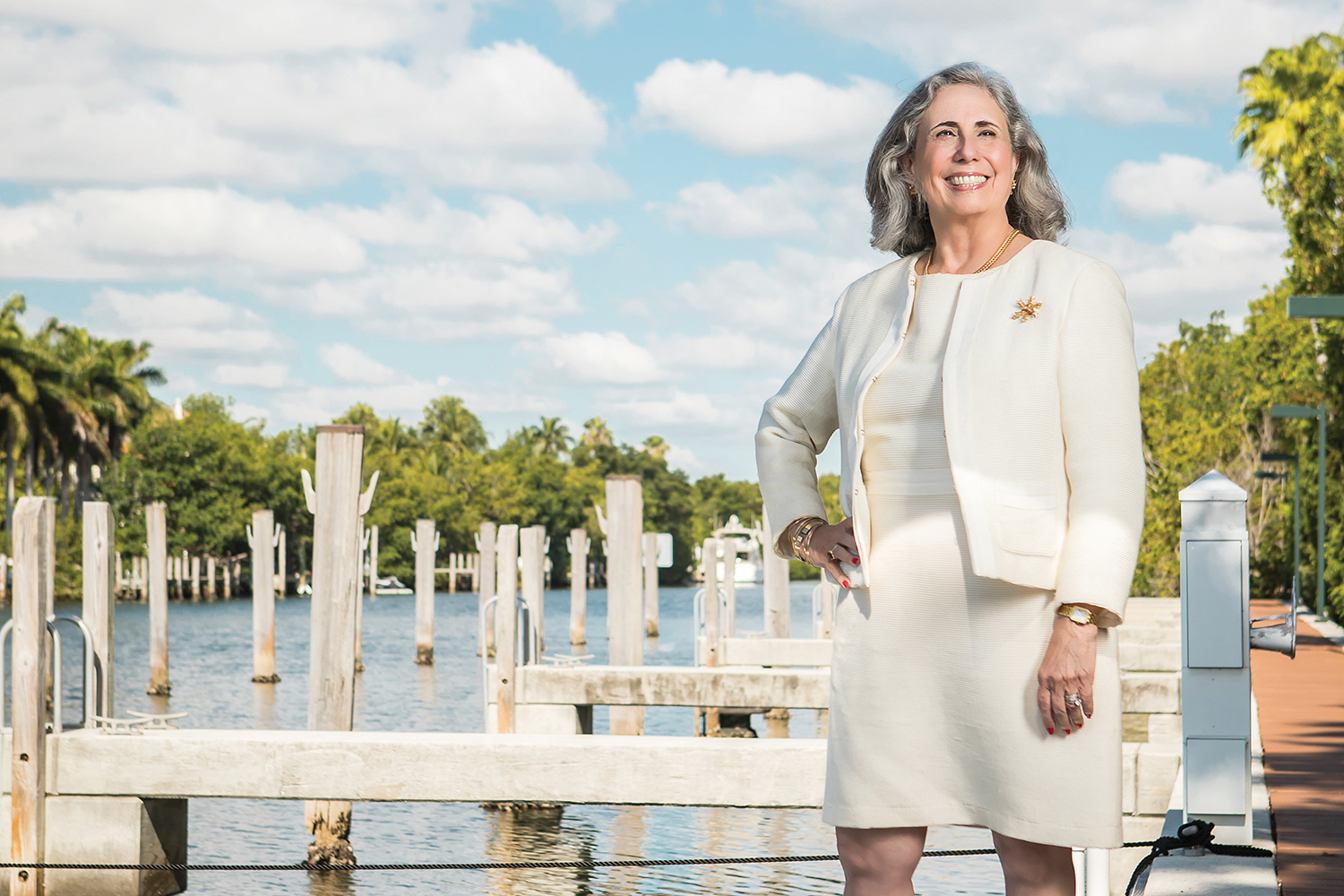
That economic situation was not easy. Raul Ernesto, her father, was not trained to practice law in Florida (in Cuba, they followed the Napoleonic Code). Margarita, her mother and once one of Cuba’s wealthiest women, took a job at a toy store. When Teresa began school, “we couldn’t afford to buy the uniforms so my mother would find somebody who could sew them.” But, to put this in context, the family had it better than many Cuban exiles: They could afford the house, and both parents and two older brothers spoke English. Teresa started second grade knowing no English, but by the end of the year she was nearly fluent.
In the meantime, the local Cuban exile community kept up morale. Weintraub recalls many gatherings in Key Biscayne, all a far cry from the glamorous parties back home. “You know, it’s funny, I remember soon after we got here my parents having their friends over. And people would come with their bottle of scotch and they would leave with their bottle of scotch. It was really an incredible lesson about how you can be together and not have to go through a lot of preparation to do the ‘right thing.’”
While her mother worked—later she became a successful real estate broker—her father went back to law school: A new state provision allowed Cuban lawyers to accelerate getting an American law degree in one-and-a-half years, rather than the standard three. And Weintraub’s two oldest brothers, Raul J. and Gonsalo, made their way, too. “The joke was that, back in Cuba, my mother wanted one of my brothers to be a lawyer and go into my father’s law business, the other to be a banker to go into her family’s banking business,” says Weintraub. “They did become a lawyer and a banker—but there was no law firm and there was no bank.”
And what did her parents want for their only daughter? “Honestly, there was just an expectation that I would get married,” says Weintraub. “I had to fight to go away to school.” But Raul Ernesto came to realize that, in America, a woman must become educated in order to take care of herself if no man could. Back in Cuba, the girls in his family had been instructed by the nuns of the Sacred Heart. He would support Teresa if she did the same. Thus her pedagogical path: the South Florida college prep school Carrollton School of the Sacred Heart, then Newton College of the Sacred Heart, which merged with Boston College in 1974.
Weintraub majored in American Studies at Sacred Heart, and took notice when one of her roommates, Cathy Coffey ’74, went on to BC Law, which had barely 20 percent female students at that point. Weintraub considered her future: Perhaps the foreign service, perhaps the law, perhaps business. “I always liked business from the time I was a young girl,” she says. “I was industrious. I would make jewelry and sell it in different gift shops. I liked math, so I knew that probably business law would be the way I would go.”
At BC Law, she was keen on torts and international law, gravitated toward classes with Professor Mary Ann Glendon, and was especially interested in the tax law courses she took from Professor Hugh Ault. “I think I was a diligent student, but I wasn’t a bookworm and I also enjoyed myself,” reflects Weintraub.
After law school, Weintraub went to New York to work in Exxon Corporation’s law department, and then headed home to its Miami office. In 1982, she met and married an attorney named Lee Weintraub. Their son, Rob Weintraub, marvels how fast things went after that. “On the fifth anniversary of their first date, my sister Sarah, the third kid, was born.” The second child’s name, by the way? That would be Margarita, christened for her indomitable maternal grandmother.
As family responsibilities grew, Weintraub decided to leave Exxon for the University of Miami, where she held a series of positions in the development office.
“I clearly did a total career change,” says Weintraub. “I had no flexibility at Exxon and it was at a time when it was very tough for women who wanted to have a career as well as children. So I needed something that allowed me to do both.” She loved that Rob, Margarita, and Sarah could go to an elementary school right on campus and, for a time, Weintraub was president of its PTA—just one of many substantial volunteer commitments she would take on in the decades to come.
What was she like as a mom, Rob is asked. “When she needed to be tough, she was tough,” he said. “When she needed to be nurturing, she was nurturing. When she needed to give us space to go be a knucklehead kid, she gave us space to go be a knucklehead kid, too. She was always just what was right.”
“My whole life has really been a series of short-term goals. Because too much can happen. Things can change right out from under you, as I learned at the beginning of my life.”
Later, Weintraub left the university and moved into wealth management, working at Northern Trust, and later becoming the President and CEO of the Fiduciary Trust of the South, where she stayed for eighteen years. She’d veered away from a legal career, but says her law training has been invaluable at every turn. “The influence of being a lawyer has taught me how to think through problems,” explains Weintraub. “How to take a look at the big picture and then figure it out, not shoot from the hip.”
Now she is an international wealth advisor—in partnership with her son—as part of the Weintraub Adessi Group at Merrill Lynch in Coral Gables, Florida. Says Rob Weintraub: “She builds these incredible, very meaningful relationships with her clients and just consistently delivers amazing advice and friendship and thoughtfulness to those relationships. They’re particularly close for the financial advice business. And I think that’s unique.”
Meanwhile, her brothers have flourished, too. Raul J. Valdes-Fauli is the mayor of Coral Gables, an office he’s held on and off since 1993, while Gonzalo was head of Latin American services for Barclays bank, and José was president of South Florida’s Colonial Bank.
This prowess has not gone unnoticed. Just as the Valdes-Faulis were renowned in Cuba, so they have remade their mark in Florida. Weintraub likes to quote her husband about this hard-won success: “He says that we are resilient. We don’t let anything keep us down.” In fact, back in 2005, the Miami New Times named the Valdes-Faulis Florida’s “Best Power Family.”
And that “power family” has also been powerfully generous.
Weintraub has borne this out in many ways, from volunteering at migrant camps when she was a teenager to serving on many boards thereafter, such as Miami Jewish Health Systems and the United Way (where she helped set up an after-school program across Dade County). Along the way, she has spearheaded an organization called Philanthropy Miami (formerly Leave a Legacy). In that role, she has helped lawyers and advisers learn the best ways to counsel their clients about philanthropic giving, and also coached local nonprofits about strategies to bolster their assets. Since her development days at the University of Miami, says Weintraub, “I have really enjoyed finding causes and connecting people to those causes.”
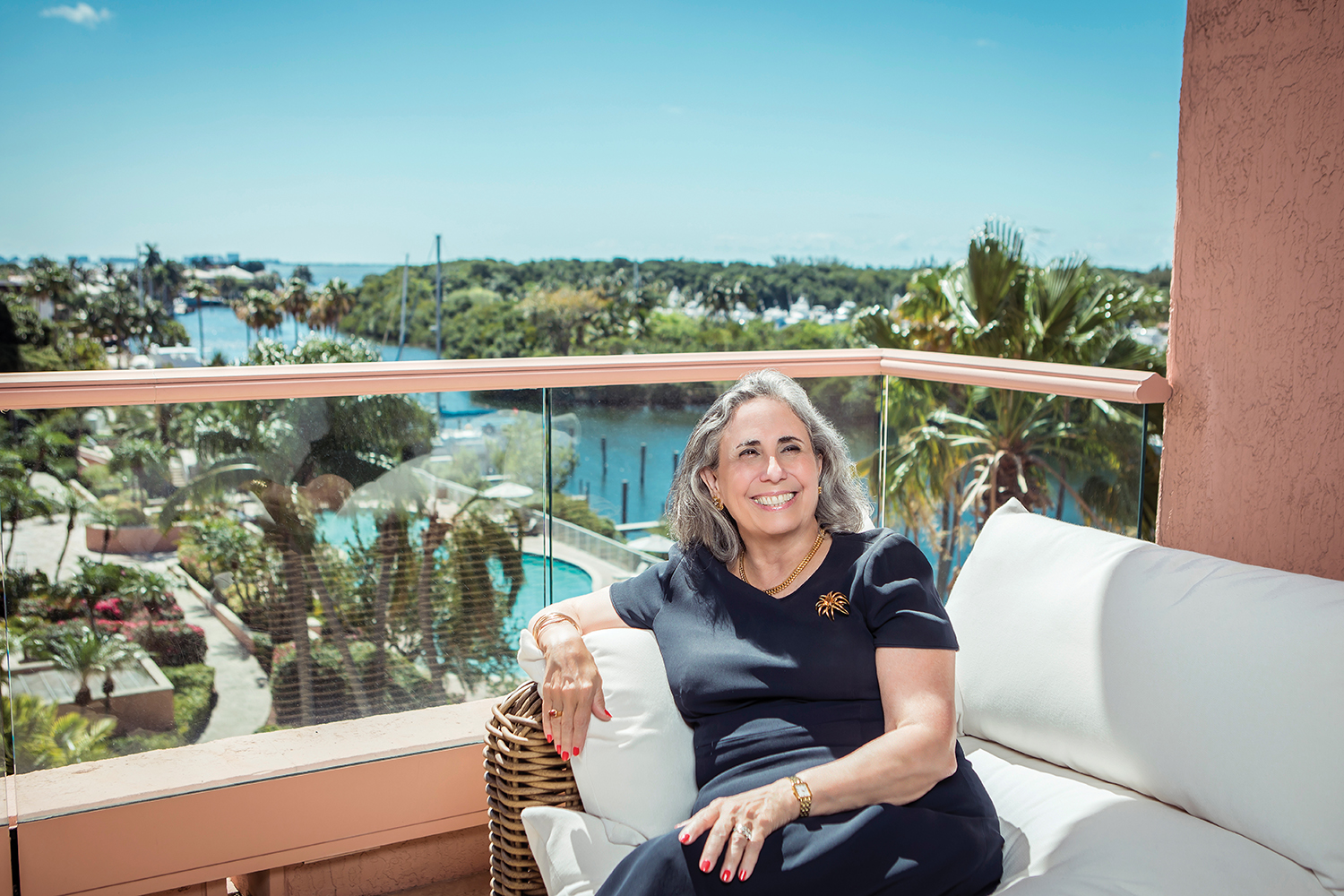
More than anything, Weintraub loves to travel and she estimates she has been to ninety—ninety!—countries on pleasure and business, often tied to her role as global president of the International Women’s Forum (IWF), an invitation-only organization dedicated to mentoring, training, and setting up networks for women in leadership, with 7,500 members around the world. (Before taking on the global role, she was president of the Miami-Dade County chapter.)
Jill Nexon Berman ’78, who co-hosted with Weintraub an event for BC Law alumni in Miami, says of her friend: “Teresa is very classy, dignified. Miami is a lot of flash and she’s not like that. She is a person of substance and her values are in the right place.”
Call up people who know Weintraub, and they fall over themselves in their praise for her and the impact she’s had in her home state and beyond. Take community activist Ruth Shack. Weintraub and Shack have served together on various boards: “Teresa is a sheer delight, introspective, in love with her family, fun to be with,” says Shack. “She comes from a solid family, has core values that are just impeccable, and has the energy to act on spreading the good message. Those who know her respect her—and adore her.”
Weintraub has been back to Cuba three times since her family fled for their lives, once in the ’90s, and again in 2013 and 2017—the last time, she met with Cuban human rights activist Yoani Sanchez. On some of these trips, three living generations of Valdes-Faulis have gone to see the old family home in the Vedado. It had been used as a meeting place for political organizations in the early days of the revolution, and then became a children’s school, and now has fallen into disrepair due to lack of upkeep and tropical storm damage.
They also stopped by the Palacio de los Capitanes Generales, the old governor’s palace, which is now a museum devoted to Havana history. On display there, they saw some of their family’s china and the other goods that were confiscated decades ago. Recently, they learned that the Pedroso mausoleum has been desecrated, with the name of Jacinto Pedroso, Weintraub’s illustrious banker grandfather, sanded out.
It seems fair to ask if all this makes her sad. The deprived state of the people who stayed in Cuba makes her sorrowful, she admits, but long ago she let go of resenting what happened to her own family. And by setting up a partnership with her son, she has managed to create a family business of sorts, reviving the generational tradition that was so radically disrupted.
At the end of the day, Teresa Valdes-Fauli Weintraub says, she lives for the moment: “I never make long-term goals for myself. My whole life has really been a series of short-term goals. Because too much can happen. Things can change right out from under you, as I learned at the beginning of my life.”


